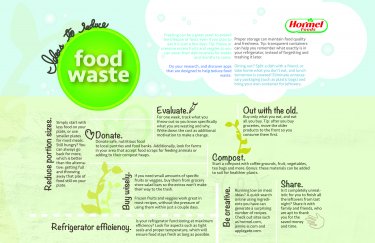Each week, Jane, a mother of two, goes to the grocery store to buy food for her family. She comes home to put it away and throws out food from the week before that was never eaten – everything from fruits and vegetables, to lunch meat and milk.
“The frustrating thing is I do this over and over, and I don’t have a lot of money to be spending on food in the first place,” she said. “It becomes a habit, a cycle I guess.”
Nick, who lives alone, can definitely relate. “I guess I don’t do a very good job planning,” he laughed. “Some weeks I buy a lot of groceries but end up eating out for most of my meals, so I have to throw out a lot of what I bought at the grocery store.”
Does this sound familiar? This is the constant cycle many of us find ourselves in each and every week. The reality is that while food companies, grocery stores and restaurants are all trying to reduce food waste, there are things we can all do at home to do our part as well.
Combating Food Waste
But first, why is it so important in the first place? Forty percent of the food in the U.S. is never eaten. This equates to $218 billion when you consider the cost of the food, wasted water, energy, fertilizers, etc. Most food waste ends up in landfills where it decomposes and releases methane. And while 40 percent of the food in the U.S. is never consumed, one in eight Americans are food insecure.1
So now that you are committed to doing your part in stopping the food waste cycle, here are some tips to help you get started or to further your existing efforts. By making even just a few small changes, you can help reduce food waste – and you will feel good about making a difference in the process!
Click here for a printable handout of these tips that you can keep in your kitchen.

